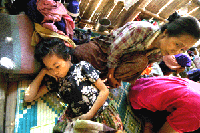
African News Roundup
The African Union in Sudan and Somalia, the DRC after the elections, World Social Forum in Kenya, 95 years of the ANC

The African Union in Sudan and Somalia, the DRC after the elections, World Social Forum in Kenya, 95 years of the ANC

The sudden defeat of the Islamic Courts Union (ICU) by the Ethiopian army and their U.S. backers proved easier then expected. A reported 15,000 Ethiopian troops and U.S. aerial bombardment succeeded in installing the Transitional Federal Government, two years after its formation in neighboring Kenya.

The WSF belief is expressed in their slogan: "another world is possible". But to what extent does this include a women's perspective?
The seventh annual gathering of the World Social Forum brings the world to Africa as activists, social movements, networks, coalitions and other progressive forces from Asia-Pacific, Latin America, the Caribbean, north America, Europe and all corners of the African continent converge in Nairobi, Kenya for five days of cultural resistance and celebration (20-25 January 2007).

Struggles over civic status have been said to characterize youthful rebellion, especially that of the Sixties. Such battles over who counts as worthy of which human rights are, of course, all the more urgent in times of war. So it is worth interrogating the concepts of youth protest and radical citizenship as we plot our way out of the course set by the current power brokers.
It is particularly appropriate to be having this conversation today, December 4, the thirty-seventh anniversary of the Chicago police murders of Black Panther leaders Fred Hampton and Mark Clark, two young, energetic, and brilliant organizers who gave life and meaning to what society is supposed to be about: empathic people deeply engaged in how the world does and could function. A dynamic speaker and humble leader, Hampton was 21 years old and poised to enter the national leadership of the Black Panther Party at the time of his murder. His murder in 1969 had a chilling effect on not just the Black Panther Party but the radical movements of the period overall. The blatant pride with which the Chicago police carried out the murders was the visible manifestation of J. Edgar Hoover’s then-classified note in an FBI memorandum around the time saying that African Americans needed to understand that a Black radical was a dead radical, as far as the state was concerned.

EI TU TA, Burma-At 35, Naw Win Schwe has already lost more than she cares to think about. During a government military offensive near Mon township in March, Naw Win's husband Maung Thanlwin was arrested and killed by Burma's ruling State Peace and Development Council (SPDC). Since then she has also lost her home, land and almost everything she and her husband had once owned. Eventually she was forced to flee for her own life as well, which is how she ended up in the Ei Tu Ta refugee camp on the eastern edge of Burma's Karen state.

In what seems to be becoming a signature atrocity of US President George Bush's "war on terror", US air strikes hit a Somali wedding ceremony, according to a January 10 BBC Online report. Up to 31 people were killed.
Copyright Toward Freedom 2019